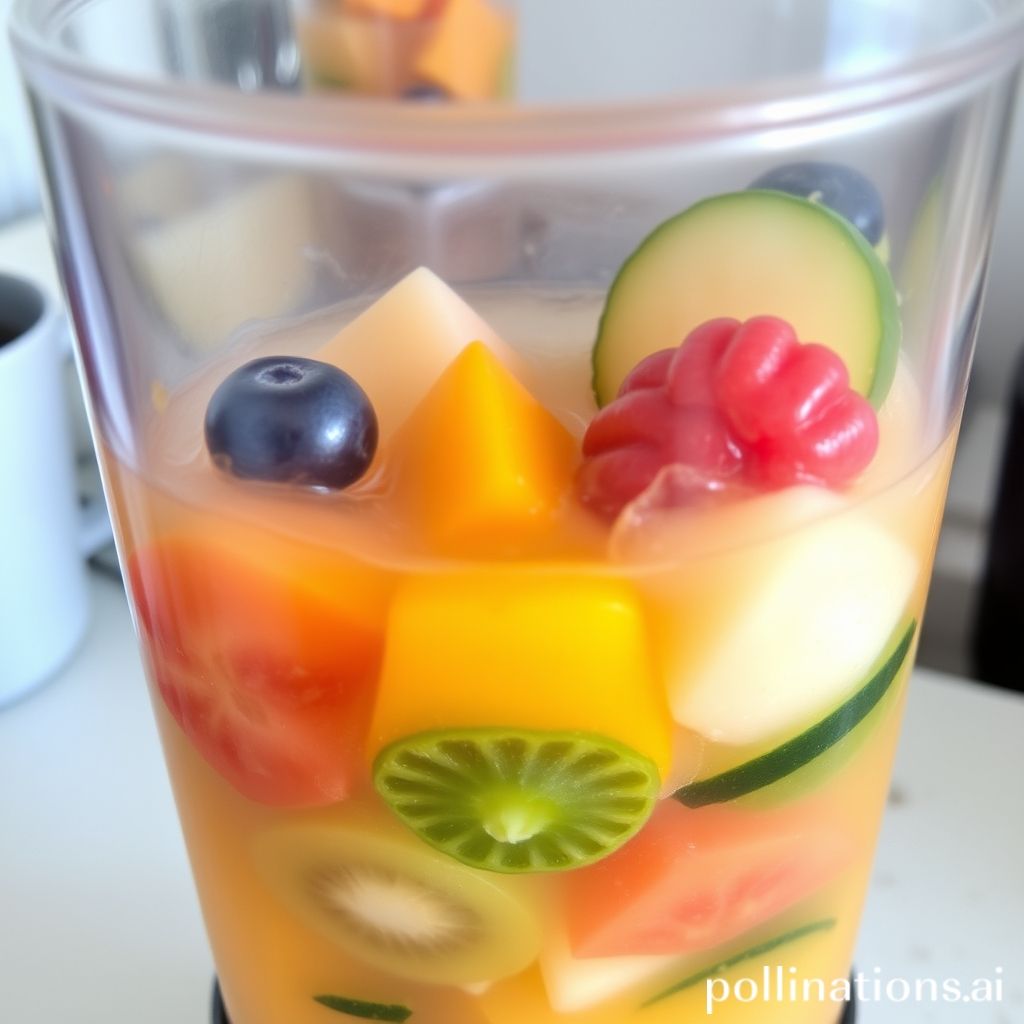Can You Have a Smoothie While Fasting? Expert Insights Revealed
In terms of fasting, many people are curious about whether or not they can enjoy a refreshing smoothie. The question arises: Can I drink a smoothie During fasting? People are searching for answers, wondering if sipping on a delicious blend of fruits and vegetables would break their fast or if it is permitted during fasting periods.
This is a topic of interest for those who are looking to incorporate smoothies into their fasting routine During still reaping the benefits of this dietary practice. Let’s explore the facts and uncover whether indulging in a smoothie is compatible with fasting.

Table of Contents
What is Fasting?
Fasting is the practice of abstaining from food or certain types of food for a specific period of time. It has been used for centuries for religious, spiritual, and health reasons. Apprehending the concept and purpose of fasting is important for those considering incorporating it into their lifestyle or making dietary choices during fasting periods.
1. Defining Fasting and its Purpose
Fasting is intentionally restricting food intake for a certain period to create physiological and metabolic changes that promote health benefits. The purpose of fasting varies depending on individual goals and motivations. Some people fast for religious or spiritual reasons to deepen their connection or purify their mind and body. Others use fasting as a dietary approach to manage weight, improve metabolic health, or enhance overall well-being.
2. Demonstrating Different Types of Fasting
There are different types of fasting practices, each with its own approach and guidelines. Two commonly known types of fasting include:
Intermittent Fasting:
Intermittent fasting involves cycling between periods of fasting and eating. Popular methods include the 16/8 method, where individuals fast for 16 hours and have an 8-hour eating window, and the 5:2 method, which involves eating normally for five days and restricting calorie intake for two non-consecutive days.
Water Fasting:
Water fasting is a more extreme form of fasting where only water is consumed for a specific duration, usually lasting 24 to 72 hours. It requires careful supervision to ensure safety and adequate hydration.
Other variations of fasting include juice fasting, where only fruit or vegetable juices are consumed, and alternate-day fasting, where individuals alternate between fasting days and regular eating days.
Apprehending the different types of fasting can help individuals choose an approach that aligns with their goals and preferences. It is important to consult with a healthcare professional or registered dietitian before starting any fasting regimen, especially for individuals with underlying health conditions or specific dietary needs.
Expert Tips: Learn about the different types of fasting, such as intermittent fasting and water fasting, to find an approach that suits your goals and preferences. Consult a healthcare professional before starting any fasting regimen.Benefits of Fasting
Fasting has become popular due to its potential health benefits. Here are some advantages of incorporating fasting into your lifestyle:
1. Weight Loss
Fasting can help with weight loss by promoting calorie restriction and increasing fat burning. By limiting your eating window, fasting creates a calorie deficit, which can lead to shedding excess pounds.
2. Improved Insulin Sensitivity
Fasting has been shown to improve insulin sensitivity, which is important for managing blood sugar levels. This can be especially beneficial for individuals with type 2 diabetes or those at risk of developing it.
3. Autophagy
Autophagy is a natural cellular process that involves recycling and repairing damaged cells. Fasting stimulates autophagy, which can contribute to improved cellular health and longevity.
To provide more information, let’s explore each of these benefits:
| Benefit | Description |
|---|---|
| Weight Loss | Fasting helps create a calorie deficit, leading to weight loss. It also promotes fat burning and can assist in achieving sustainable weight management. |
| Improved Insulin Sensitivity | Fasting enhances insulin sensitivity, allowing better control of blood sugar levels. This can reduce the risk of insulin resistance and type 2 diabetes. |
| Autophagy | Fasting stimulates autophagy, a process that helps remove damaged cells and supports cellular repair. This can contribute to overall cellular health and potentially prevent certain diseases. |
What is a smoothie?
1. Defining a smoothie
A smoothie is a blended beverage made with fruits, vegetables, and other ingredients. It is a popular choice for those seeking a healthy and convenient meal or snack option.
2. Components of a smoothie
A typical smoothie consists of:
- Fruits: Bananas, berries, mangoes, or apples are commonly used as the base for a smoothie.
- Vegetables: Spinach or kale can be added to provide additional nutrients.
- Liquid: Common liquids used in smoothies include water, milk, yogurt, or plant-based milk alternatives.
- Add-ins: Additional ingredients like protein powder, nut butter, seeds, or sweeteners can be incorporated for flavor and nutrition.
3. Health benefits of smoothies
Smoothies offer several health benefits, including:
- Nutrient-rich: Smoothies are an easy way to include a variety of fruits and vegetables in your diet, providing essential vitamins, minerals, and antioxidants.
- Digestive health: The fiber content in smoothies can promote healthy digestion and regular bowel movements.
- Hydration: Smoothies can help fulfill your daily fluid intake requirements, especially if made with water or a hydrating liquid.
- Weight management: Smoothies can be a satisfying and low-calorie option for those looking to manage their weight.
4. Smoothies and fasting
As for fasting, consuming a smoothie can vary depending on the fasting protocol and individual goals. Some key points to consider include:
- Intermittent fasting: A smoothie may break an intermittent fast if it contains calories. Despite this, some individuals choose to include low-calorie smoothies during their fasting window.
- Extended fasting: During longer fasting periods, it is generally recommended to avoid consuming anything other than water.
- Modified fasting: Certain modified fasting methods, such as juice fasting or smoothie fasting, allow the consumption of specific liquid-based foods like smoothies. Despite this, it is essential to follow the guidelines of the specific fasting plan.
Consulting with a healthcare professional or nutritionist is important to determine the best approach to incorporating smoothies into your fasting routine.

Ingredients in a Typical Smoothie
Listing Common Ingredients Used in Smoothies
A typical smoothie is a blended beverage made with a variety of ingredients. Here are some common ingredients used in smoothies:
- Fruits: Smoothies often contain fruits like berries, bananas, mangoes, and pineapple for their natural sweetness and flavor.
- Vegetables: Leafy greens such as spinach or kale, and vegetables like cucumber or carrots can also be included in smoothies to add nutritional value.
- Yogurt: Yogurt is a popular ingredient in smoothies as it adds creaminess and provides probiotics, which are beneficial for gut health.
- Milk: Smoothies can be made with different types of milk like dairy milk, almond milk, or coconut milk as a base liquid.
- Sweeteners: Some smoothie recipes call for sweeteners like honey, agave syrup, or maple syrup to enhance the taste.
Discussing the Nutritional Value of These Ingredients
The ingredients used in smoothies offer various nutritional benefits:
- Fruits: Fruits are packed with vitamins, minerals, and antioxidants, providing essential nutrients for overall health and supporting the immune system.
- Vegetables: Adding vegetables to smoothies boosts their fiber content and provides additional vitamins and minerals. Leafy greens are particularly nutrient-dense.
- Yogurt: Yogurt is a good source of protein, calcium, and probiotics. It contributes to a smoothie’s creamy texture and promotes gut health.
- Milk: Milk adds calcium and protein to smoothies, contributing to bone health and providing sustained energy.
- Sweeteners: Whilst sweeteners can enhance the taste of a smoothie, it’s important to use them sparingly. Natural sweeteners like honey offer some additional nutritional value compared to refined sugars.
By combining these ingredients, smoothies can be a convenient and delicious way to incorporate a variety of nutrients into your diet.
| Information |
|---|
| Smoothies are blended beverages made with various ingredients. |
| Fruits, vegetables, yogurt, milk, and sweeteners are common ingredients in smoothies. |
| These ingredients offer nutritional benefits such as vitamins, minerals, antioxidants, protein, calcium, and probiotics. |
| Smoothies provide a convenient way to incorporate a variety of nutrients into your diet. |
Does drinking a smoothie break a fast?
1. Factors to consider.
When determining if drinking a smoothie breaks a fast, it is important to consider the fasting protocol being followed. Different fasting methods have different guidelines for what is allowed during the fasting period. Additionally, the calorie and carbohydrate content of the smoothie can also impact fasting.
2. Impact on insulin levels.
Insulin levels are crucial to consider when evaluating the effects of a smoothie on fasting. Some ingredients commonly found in smoothies, like fruits or sweeteners, can cause an increase in insulin levels. Higher insulin levels can potentially disrupt the fasting state, as fasting aims to keep insulin levels low.
3. Expert insights.
Opinions and research findings from experts can provide valuable insights into whether drinking a smoothie breaks a fast. During some experts argue that any caloric intake breaks a fast, others suggest that as long as the calorie and carbohydrate content is minimal, the benefits of fasting can still be achieved. It is important to consider different viewpoints and individual considerations when making a decision.
Conclusion
The question of whether one can drink a smoothie At the same time fasting depends on the type of fast and the goals one has set for themselves. At the same time some fasting methods strictly prohibit any caloric intake during the fasting period, others allow for limited calories or certain types of liquids like smoothies.
It is important to consult with a healthcare professional or a nutritionist to determine the best approach for your fasting journey. Ultimately, the decision to consume a smoothie At the same time fasting should align with your specific fasting goals and ensure that it does not compromise the intended benefits of fasting.
FAQ about Drinking Smoothies In the course of Fasting
FAQ 1: Can I have a smoothie during intermittent fasting?
Yes, you can have a smoothie during intermittent fasting. Albeit, it is important to ensure that the smoothie does not contain any high-calorie or sugary ingredients that may break your fast. Opt for smoothies that are low in calories and sugar to stay within the fasting guidelines.
FAQ 2: What ingredients should I avoid in a smoothie In the course of fasting?
When fasting, it is best to avoid ingredients such as added sugars, sweeteners, dairy products, and high-calorie fruits like bananas or mangoes. Instead, focus on incorporating low-calorie fruits, vegetables, and healthy fats like avocado or nuts into your smoothie.
FAQ 3: Will drinking a smoothie with no added sugar break my fast?
No, drinking a smoothie with no added sugar generally will not break your fast. Albeit, it is essential to be mindful of the total calorie intake from the smoothie. Keep the calorie content low and avoid any ingredients that may spike your insulin levels.
FAQ 4: Can I have a smoothie during a water fast?
During a water fast, it is recommended to only consume water and avoid any solid or liquid food, including smoothies. Water fasting involves consuming zero calories, which allows your body to enter a deeper state of fasting and reap its potential benefits.
FAQ 5: How can I make a fasting-friendly smoothie?
To make a fasting-friendly smoothie, focus on using low-calorie ingredients such as leafy greens, berries, cucumber, celery, and unsweetened almond milk or coconut water as the base. You can also add a source of healthy fat like chia seeds or flaxseeds to increase satiety. Avoid using high-calorie fruits, sweeteners, or dairy products in your fasting-friendly smoothie.
Read Similar Post:
1. Can You Safely Enjoy Smoothies with Invisalign? Find Out Now
2. The Nutritional Benefits of Smoothie Bowls: Enhance Your Well-being with Delicious Recipes

